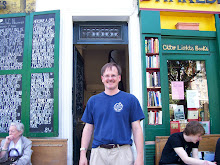Wednesday, February 14, 2007
What will you do with your salary? Ninety percent I'll spend on good times, women, and Irish whiskey. The other ten percent I'll probably waste.
This recent book review of a quotation dictionary is (perhaps more than) marginally relevant to our class. Quotations, like proverbs, circulate widely and serve a similar function in everyday discourse. Many times we repeat quotations without knowing who "said them" originally, so they become quasi-anonymous. They also seem to settle into a more "quotable" bumper-sticker-like form. They might not have survived in their original state.
Be attentive to what you hear all around you. Listen for
(1) Clichés or stock phrases. "Get a life." "Too much information."
(2) "Snowclones."
(3) Proverbs.
How much of ordinary conversation consists of these elements?
The author of La Celestina was obviously closely attuned to this language in his own day. I'm sure he had the equivalent of a quotation dictionary that he had compiled himself before writing this work.
There used to be a practive of keeping a "commonplace book," in the 18th century. A person would write down quotations, maxims, etc... to use when writing. Kind of a storehouse of information.
In the 19th century, the French writer Flaubert compiled a "dictionary of received ideas." He wrote down *dumb* things that he heard people say without thinking, automatically in most cases. Like "apricots: we won't have good ones this year."
This dictionary could be conceived of as an "anti-commonplace" book, in the sense that Flaubert is not going to use these ideas himself. Mockery, not imitation, is his goal. He thus places himself at odds with a particular oral tradition. In some sense Fernando de Rojas is in a similar state: he is somewhat cynical, like Flaubert, and thus might cite a proverb against the grain, using it for a perverse rather than edifying purpose. I don't believe he is as cynical as Flaubert: he still views quotations from famous authors as a source of wisdom. There is, however, a sense in which his proverbs "cut both ways," since an ostensibly sound piece of advice can be disastrous if used wrongly.
Think also of how Sancho Panza's refranes "speak him," rather than vice-versa. That is similar to the way in which the targets of Flaubert's satire are spoken by the commonplaces or "received ideas" which they mouth. We know that Flaubert was a huge admirer of Cervantes. Madame Bovary, like Don Quixote, is perverted by too much reading of sentimental fiction.
Any area of popular culture or everyday life will be rife with commonplaces, be it entertainment, sports, or politics. Listen next time you hear someone interviewed from any of these areas. What are you hearing?
This recent book review of a quotation dictionary is (perhaps more than) marginally relevant to our class. Quotations, like proverbs, circulate widely and serve a similar function in everyday discourse. Many times we repeat quotations without knowing who "said them" originally, so they become quasi-anonymous. They also seem to settle into a more "quotable" bumper-sticker-like form. They might not have survived in their original state.
Be attentive to what you hear all around you. Listen for
(1) Clichés or stock phrases. "Get a life." "Too much information."
(2) "Snowclones."
(3) Proverbs.
How much of ordinary conversation consists of these elements?
The author of La Celestina was obviously closely attuned to this language in his own day. I'm sure he had the equivalent of a quotation dictionary that he had compiled himself before writing this work.
There used to be a practive of keeping a "commonplace book," in the 18th century. A person would write down quotations, maxims, etc... to use when writing. Kind of a storehouse of information.
In the 19th century, the French writer Flaubert compiled a "dictionary of received ideas." He wrote down *dumb* things that he heard people say without thinking, automatically in most cases. Like "apricots: we won't have good ones this year."
This dictionary could be conceived of as an "anti-commonplace" book, in the sense that Flaubert is not going to use these ideas himself. Mockery, not imitation, is his goal. He thus places himself at odds with a particular oral tradition. In some sense Fernando de Rojas is in a similar state: he is somewhat cynical, like Flaubert, and thus might cite a proverb against the grain, using it for a perverse rather than edifying purpose. I don't believe he is as cynical as Flaubert: he still views quotations from famous authors as a source of wisdom. There is, however, a sense in which his proverbs "cut both ways," since an ostensibly sound piece of advice can be disastrous if used wrongly.
Think also of how Sancho Panza's refranes "speak him," rather than vice-versa. That is similar to the way in which the targets of Flaubert's satire are spoken by the commonplaces or "received ideas" which they mouth. We know that Flaubert was a huge admirer of Cervantes. Madame Bovary, like Don Quixote, is perverted by too much reading of sentimental fiction.
Any area of popular culture or everyday life will be rife with commonplaces, be it entertainment, sports, or politics. Listen next time you hear someone interviewed from any of these areas. What are you hearing?
